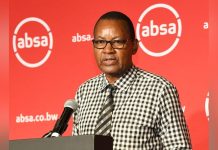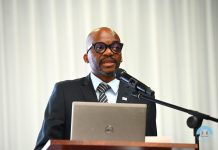Africa-Press – Botswana. The institute for combating illicit financial flows that University of Botswana will host will assist in preparations for mutual evaluation under the Eastern and Southern Africa Anti-Money Laundering Group (ESAAMLG) cycle in January 2027.
Financial Intelligence Agency (FIA) Director General, Ms Bopelokgale Soko said Botswana was going onto the third of mutual evaluation under ESAAMLG hence the centre would be used to build the required capacity.
Ms Soko was speaking during the signing of Memorandum of Understanding (MoU) by FIA and the University of Botswana (UB) on the establishment of the institute in Gaborone on Monday.
Paying emphasis on training and capacity building, she said they were the yardstick used by the Financial Action Task Force (FATF) to measure the effectiveness of the country’s anti-money laundering and combating the financing of terrorism regime in implementing the FATF standards.
“As a result, FATF requires countries to have training and capacity building policies aimed at increasing the capacity of a country to effectively implement the FATF standards,” she said.
She said the FATF also believed corporation and collaborations were some of the most effective tools in the fight against money laundering, hence the signing of the MoU.
She therefore, hailed establishment of the institute and said it was envisaged to assist the country in closing gaps in anti-money laundering strategies.
Ms Soko said the United Nations on Trade and Conference established that annually, Africa lost billions due to illicit financial flows, the amount she said was more than the Gross Domestic Product of some African countries.
She said the most affected countries were the mineral-rich developing countries including Botswana.
She further said the establishment of FIA was a policy response to anti-money laundering and combating the financing of terrorism issues in Botswana. For his part, University of Botswana Acting Vice Chancellor Mr Dawid Katzke acknowledged their capacity, skills and experience to host and run the institution.
He said the university was committed to working with government agencies entrusted with combating illicit financial flows to provide essential training and research and to collaborate on critical areas in combating illicit financial flows.
He also said the blending functions of UB and other domestic and international agencies would enhance the country’s capacities to fight financial crime and improve effectiveness in compliance with international standards.
He said combating illicit financial flows was a priority for all countries, Botswana included.
The Acting Vice Chancellor said internal and external collaboration was essential since illicit financial flows and associated money laundering, financing of terrorism and proliferation of arms of mass destruction were transactionally organised.
He also observed that complex crimes were committed by groups or networks operating in more than one country.
He further said advancements in technology, digitalisation and globalisation had narrowed the physical borders and increased the success rate in the commission of financial crimes hence the need for collaborations.
Mr Katzke said at the core of the UB’s strategy to transition Botswana to a knowledge-based economy was the critical need for to enhance societal engagement and economic impact.
He further said the strategy required the University to be a key player by being responsive to the needs and expectations of society.
Buttressing on Mr Katzke’s words, Deputy Vice Chancellor (Research and Innovation), Professor Doreen Ramogola-Masire said the issue of money laundering was an entrenched problem. Prof. Ramogola-Masire said people involved in money laundering were forever evolving hence the need for scientists to be on the forefront of research and innovation.
She further said as a higher institution of learning, they were concerned about capacity building, training and research and were always ready to assist where possible.
For More News And Analysis About Botswana Follow Africa-Press






